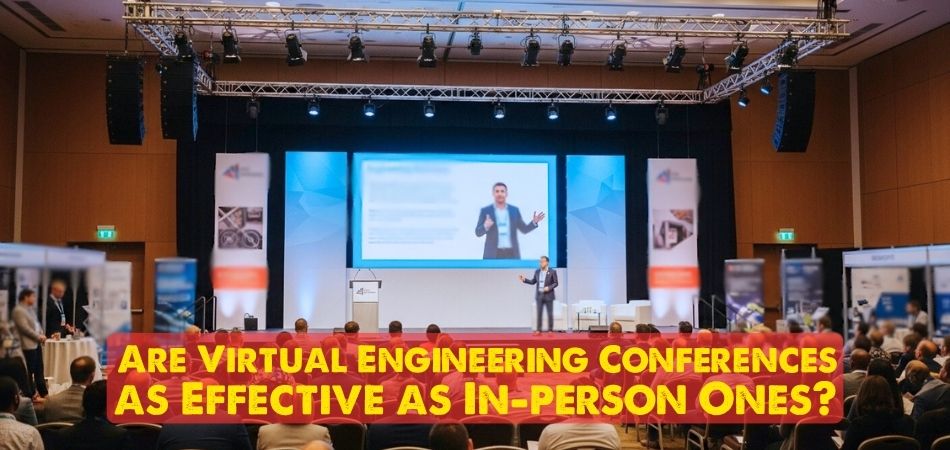Virtual engineering conferences let people join from anywhere. They are cheaper, easy to access, and save travel time. You just need a device and the internet to attend. This makes it possible for more people to take part.
But are virtual engineering conferences as effective as in-person ones?
Virtual events help more people join and save money, but they miss real face-to-face talks. In-person events feel more personal. They help people connect better and learn by doing. A mix of both is often the best choice.
Want to know which one works better for you? Keep reading as we look at the pros and cons of each.
Are Virtual Engineering Conferences as Effective as In-person Ones?
Virtual engineering conferences are useful in many ways, but they aren’t exactly the same as in-person events. They help more people join, save money, and offer good learning options. But when it comes to networking, hands-on work, and staying focused, in-person still leads. To understand which format works best, it helps to look at how each one performs in key areas. Here’s a breakdown of what matters most when comparing these two types of conferences.

Accessibility and Reach
Virtual conferences allow people from all over the world to take part without high costs or travel issues. A 2020 IEEE report found online attendance grew by nearly 30–50% compared to physical events. This makes a huge difference for people limited by money, time, or visa problems.
In-person events often happen in big cities or expensive venues, which not everyone can attend easily. Virtual formats solve that by giving access to students, small companies, or international attendees. Countries like the USA, UK, Germany, and Japan often host top conferences; for example, conferences in USA are known for high-quality content and global reach.
Content Delivery and Flexibility
Keynotes, talks, and sessions shared online can still offer great value for attendees and learners. Many platforms now allow recorded sessions, so people can learn anytime and revisit topics later. According to a 2021 PCMA survey, 68% of attendees said they prefer this flexible learning style.
In-person events often follow tight schedules, which can lead to missed sessions and information overload. Virtual setups reduce this by offering easy replays, transcripts, and even downloadable slides. That gives engineers and professionals more control over how and when they learn.
Cost-Effectiveness
Virtual conferences are often 50–80% cheaper to attend than in-person ones, according to recent industry data. Attendees save money on flights, hotels, and food, which adds up quickly for global events. Organizers also spend less on venues and can invest more in expert speakers or tech tools.
Many companies now choose virtual options because of the lower budget needed to take part or send teams. For students or freelancers, the price difference can be the reason they’re able to join at all. This wider access helps bring more voices and ideas to the table.
Networking and Social Connection
In-person events give you the chance to meet people naturally during breaks, meals, or group activities. These moments often lead to lasting professional connections that are hard to form online. A 2022 EventMB report said 72% of people found virtual networking less useful for this reason.
Online chats and video calls can feel forced or awkward, making it tough to build trust or friendships. In-person conversations feel more relaxed and open, often leading to job offers or long-term work. That social energy is something virtual formats still can’t fully replace.
Hands-on Learning and Demos
Engineering events often include lab sessions, product testing, and real-world demos that are hard to do virtually. A 2023 ASME survey showed 65% of engineers prefer in-person for hands-on training and tech sessions. These activities help people understand new tools or machines better.
While some online events try to include simulations or 3D tours, they don’t match the feel of using real equipment. Physical spaces offer touch, sound, and motion that support better learning in many technical fields. This makes in-person events a strong choice for skill-based industries.
Why Are Virtual Conferences Becoming So Popular?
These days, more people are attending virtual conferences instead of traveling to big events in person. It’s not just about staying home—there are many reasons behind this growing trend. New tools, changing habits, and smart choices are all part of it. Let’s take a simple look at what’s making virtual conferences such a big deal.
Money Savings
One of the biggest reasons people choose virtual conferences is the lower cost. You don’t have to pay for flights, hotels, or food. Even the tickets are cheaper—sometimes 50% to 80% less than regular ones. This means more people can join without worrying about money. It helps both the people attending and the ones hosting the event.
Easy to Join
With virtual events, people can join from anywhere in the world using a phone or computer. They don’t need visas or have to take long flights to another country. This helps people who live far away or in places with travel restrictions. It’s also helpful for students or workers who can’t take time off. That way, no one feels left out.
Better Tech Features
Online event platforms now have cool tools to make things more fun and useful. There are breakout rooms, live chat, question boxes, and even virtual booths. Some events let you watch recordings later if you miss something. These features make the experience feel more real and easier to enjoy. People love using them because they work well and are simple to use.
Saves Time
Traveling to in-person events takes a lot of time and energy. With virtual ones, you can join from home in minutes. People like that they don’t have to skip work or school for long trips. You can also choose the sessions that matter most to you. This way, your time is used better and feels more worthwhile.
Helps the Planet
Virtual events are also better for the Earth. Since no one is flying or driving to a big city, there’s less pollution. A recent study said these events produce about 90% less carbon compared to in-person ones. That’s a big difference and helps with climate change. Many people and companies like this eco-friendly choice.
Cool New Ideas
As virtual platforms continue to grow, new things are added. Some events now have games, quizzes, or smart matchmaking to meet people. Big global events even bring together people from many countries at once. In one popular event, 75% of people tried out the new online features. It shows how fresh ideas can make online events better than ever.
Where Virtual Engineering Conferences Fall Short?
Virtual engineering conferences have made attending events easier, but they still miss some important parts. Engineers often need more than just videos and slides to learn well. In-person events offer things like real conversations, tools, and a stronger focus. Let’s look at the biggest areas where virtual formats still don’t measure up.
Weak Networking Opportunities
Meeting people online doesn’t feel the same as talking face-to-face at an event. Breakout rooms often feel awkward and lack natural flow, which hurts connection. Many engineers say hallway chats and group meals help build strong work relationships. Without real moments like those, deeper conversations just don’t happen easily.
Missing Hands-on Learning
Engineering often needs hands-on work, not just watching someone explain a concept on screen. You can’t test or feel tools through a computer, which makes learning harder. Engineers in recent studies said they learn better with real equipment and live demos. In-person events give that chance, especially when trying new machines.
Lower Focus and Attention
Sitting at home makes it easy to get distracted by chores, noise, or multitasking during talks. Many online attendees said they were less focused and didn’t remember the content well. At live events, it’s easier to pay attention because the space is built for learning. That helps engineers stay alert and take in more details.
Tech Problems and Glitches
Even a good internet setup can crash during a session or cut off sound during a live demo. These problems waste time and break the flow of learning or asking questions. Some people miss important info just because of a platform glitch. This can make it harder for engineers to join workshops or Q&A sessions.
Weaker Sense of Belonging
Real events give people a stronger feeling of being part of something big. Sharing a space with others, even just sitting at a table, helps build connection. Online events often feel cold, no matter how fun the chat or design is. A lot of people feel less motivated to interact in virtual spaces.
Access Isn’t Always Equal
Not everyone has a fast computer or strong internet to join long virtual events smoothly. In some places, people still struggle with weak tech, which blocks their full involvement. These limits can stop smart people from joining, even if they want to learn. The problem is often bigger in small towns or low-income areas.
Real conferences give people more chances to talk, test tools, and learn without tech issues or screen fatigue. It’s easier to trust others and build strong teams when meeting in person. If you’re finding engineering conferences in the USA, you’ll see many include hands-on labs and real-time sessions. These experiences help you grow in ways that online events often miss.
Can a Hybrid Conference Be the Best of Both Worlds?
Yes, it can—but only when done right. Hybrid conferences mix the ease of online events with the energy of in-person ones. If both parts work smoothly together, they offer more options for everyone who wants to join and learn.
Flexibility for Attendees
People can pick how they want to attend—online or in-person—based on what fits their life. This helps students, workers, and travelers join without stress. It also means fewer missed sessions due to travel or busy schedules. Everyone gets more freedom to learn in their own way.
Wider Audience Reach
More people can take part from different places, including those who can’t travel far or get visas easily. Hybrid events bring together voices from many countries and backgrounds. This builds stronger global conversations and helps fresh ideas grow. No one feels left out because of location.
Better Use of Technology
Good platforms can stream live talks, share recordings, and allow real-time chat for both in-person and online guests. This helps both sides feel connected during sessions. Features like polls and Q&A work well for everyone attending. Tech tools keep the event fun, smooth, and easy to follow.
Stronger Learning Options
In-person people can try hands-on labs, while online ones can learn through videos and recorded demos. Both groups get value, just in different forms. Access to replays helps everyone review and learn at their own speed. This mix supports different ways of understanding topics.
More Networking Chances
Online guests can connect using video calls or chats, while in-person guests can meet in halls. Hybrid tools now offer ways to match people with shared interests. That helps start real talks and possible team-ups. Even from home, people can make useful connections.
Smarter Planning Needed
Organizers must plan both parts equally, so one side doesn’t feel ignored or left out. Time zones, tech needs, and schedules all matter a lot. A well-balanced event needs smart planning and support. If done right, it runs smoothly for everyone involved.
When Should You Choose to Attend Virtual Engineering Conferences?
Choosing a virtual engineering conference depends on what you want, your resources, and your time. There are times when online events work better for learning and connecting. Let’s look at when it makes sense to pick a virtual option.
Budget or Travel Issues
- If travel costs are high or you need to stay home for work, a virtual event can solve these problems. You spend less money and don’t have to worry about flights or hotel rooms, which helps many people.
- Many find that online registration fees are 50-80% lower, so joining becomes easier for students or early-career engineers. Not needing a visa or to take time off work saves even more time and money.
Easy Learning Access
- Online conferences are good if you mainly want to watch presentations, keynotes, or panels about technical topics. You can pause or re-watch the recorded sessions, so tricky subjects are easier to understand after the event.
- If you want to make an engineering conference presentation interactive, many platforms now offer live polls or Q&A for better participation. These features help you join in the session, even from far away, making the learning deeper.
Global Connections
- Virtual events let you meet engineers and experts from other countries, building connections you may never make in person. You find new communities, including groups or specialists from less-known regions, which grows your network.
- More diverse voices show up at online events, letting you share ideas with people of all backgrounds. This wider group brings fresh opinions and helps you learn about different trends in engineering.
Saving Time
- If your days are busy, joining from your home or office saves hours that travel would take. You just open your computer and start learning, with no airport lines or long drives to worry about.
- You can fit in just the sessions you care about, skipping talks you don’t need. This means your time goes to the most useful topics for your work or study.
Eco-Friendly Choice
- Online events are good if you care about protecting the planet and lowering your carbon footprint. Without travel, there’s much less pollution, which supports greener ways of working and learning.
- Many engineers and companies now want to be more sustainable, so joining virtually matches these new priorities. You help the earth and still get access to all the information you want.
Access to Hot Topics
- Online platforms often offer quick access to the newest subjects, like new tools or ideas in engineering. You get the chance to hear global experts talk about changes in the field without waiting for big annual events.
- Some groups, such as IEEE, bring together smart minds for special panels on topics like AI, sensors, or new materials. These sessions are open to anyone online, not just people who travel to the main event.
FAQs about Effectiveness: Virtual Vs. In-Person Engineering Conferences
Virtual engineering conferences have changed how professionals learn and connect across the world. While both formats have their benefits, people still have many questions. Here are some fresh and relevant FAQs that dig deeper into this topic:
How Do Virtual Conferences Handle Group Work or Team Activities?
Virtual platforms now offer breakout rooms and collaborative tools, but in-person teamwork still feels more natural. Some group tasks lose their flow online, especially those needing physical materials or tools. Clear planning and strong moderation can help teams stay engaged remotely.
Are Sponsors and Exhibitors as Active in Virtual Events?
Sponsors still show up virtually, but interaction with attendees is usually lower than at physical booths. Many platforms now offer virtual expo halls or chat rooms. However, casual walk-up conversations and hands-on product demos are harder to recreate online.
Do Virtual Conferences Offer the Same Career Growth Opportunities?
Virtual conferences still provide job boards, speaker access, and skill-building sessions, but fewer spontaneous career chats happen. Networking requires more effort online. Still, many professionals have found mentors or opportunities through follow-up messages and virtual meet-and-greets after sessions.
Can Virtual Engineering Conferences Be Personalized for Attendees?
Yes, many virtual events let you build a custom schedule or follow certain topics. Some also suggest sessions based on your role or field. But the personal feel of browsing booths or asking live questions is harder to match online.
How Do Speakers Adapt for Virtual Audiences?
Speakers now use more slides, visuals, and polls to keep online viewers interested. They often record sessions in advance or include live chat support. Many also prepare shorter talks to fight screen fatigue and keep audiences focused from start to finish.
Do Virtual Events Still Offer Certifications or Continuing Education Credits?
Yes, many virtual engineering conferences still provide official certificates or credits for completed sessions. These are tracked automatically by the platform. This lets professionals learn and earn credentials from home, which helps them meet job or license requirements easily.
How Are Time Zones Managed in Global Virtual Events?
Most virtual events offer session replays, and some run sessions twice for different time zones. It’s not perfect, but it helps. Scheduling tools and calendars make it easier for global attendees to pick sessions that fit their location and routine.
Can Virtual Events Support Engineering Student Participation?
Virtual events are great for students with tight budgets or travel limits. Many offer lower fees and flexible learning options. They also give access to experienced professionals and student-specific sessions, making it easier for future engineers to join and learn.
Bottom Lines
Both virtual and in-person engineering conferences have their own good sides. Virtual ones save money, time, and are easier to join. In-person events help people meet, talk, and learn by doing.
The real question is this: are virtual engineering conferences as effective as in-person ones when it comes to real learning and connection? It depends on what you need and what you’re looking for. Some people like the ease of online, while others prefer being there in person. Many now choose both. Picking what works best for you is the smartest way forward.







